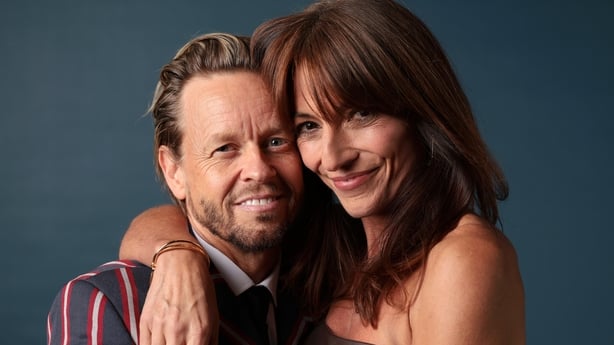Davina McCall is "utterly exhausted" but recovering in hospital after undergoing brain surgery for a "very rare" tumour.
The TV presenter said the benign brain tumour, known as a colloid cyst, was found after she was offered a health check-up as part of her menopause advocacy work.
In a statement posted on her Instagram, her partner Michael Douglas shared an update on her condition.
"Davina is out of surgery and according to the surgeon it was textbook," he wrote.
"She’s currently recovering in ICU as a precaution, as you can imagine she’s utterly exhausted.
"Thanks so much for all the love from everyone on here.. it’s powerful stuff, we are super grateful."
It comes after McCall shared a video on Instagram, revealing her diagnosis.
She said: "I'm posting this. It will be Friday morning, and I’m doing it because a few months ago, I did a menopause talk for a company, and they offered me a health scan in return, which I thought I was going to ace, but it turned out I had a benign brain tumour called a colloid cyst, which is very rare, three in a million.
"And so I slightly put my head in the sand for a while, and then I saw quite a few neurosurgeons. I got lots of opinions, and I realised that I have to get it taken out."
McCall described it as a "big" tumour, 14mm wide, adding: "It needs to come out, because if it grows, it would be bad."
She said she was having it removed through a craniotomy, a surgical procedure to temporarily remove part of the skull, and said she is in "good spirits".
"I’m going to be in hospital for about nine days, and then I’m going to be going home, but I’m going to be off my phone for a while," McCall said.
"But I don’t want you to worry about me. I’m doing that enough as it is.
"I am in a good space, and I have all the faith in the world in my surgeon and his team, and I am handing the reins over to him. He knows what he’s doing."

The former Big Brother host, who currently presents the ITV dating show My Mum, Your Dad, has long been an advocate for women's health issues and has presented documentaries on contraception and menopause.
The TV star, who started going through perimenopause at 44, said the symptoms reminded her of when she was a drug addict in her 20s due to waking up soaked in sweat.
She has also spoken about taking hormone replacement therapy (HRT) to alleviate some of the symptoms, previously telling ITV’s Loose Women: "The health benefits for me way outweighed the negatives. I’ve got dementia running in my family, it massively reduces that, reduces diabetes and it reduces the risk of heart disease by 50%."
Earlier this year, the presenter was honoured with the special recognition award at the National Television Awards for her broadcasting career and received an honorary degree from Newcastle University for championing women’s health.
McCall has also raised money for Cancer Research UK by running for Race For Life in honour of her late sister.
Her sister Caroline Baday died from lung cancer in 2012 at the age of 50.
McCall made her name on Big Brother between 2000 and 2010 during its Channel 4 run and has gone on to co-present BBC Comic Relief and Sport Relief, Channel 4’s Stand Up To Cancer, The Million Pound Drop and Long Lost Family, and voiced a robot version of herself in Doctor Who.
The TV star also regularly posts about exercising and health products and has released numerous fitness DVDs.
According to the Irish Cancer Society, not all brain tumours are cancerous (malignant). Grades 1 and 2 are benign (not cancerous) – although they can come back and become malignant.
Symptoms will depend on which area of the brain is affected by the tumour, as different areas of the brain control different activities.
Primary brain tumours can occur at any age but they are more common in people between the ages of 50 and 70.
If you have been affected by issues raised in this story, please visit: www.rte.ie/helplines

